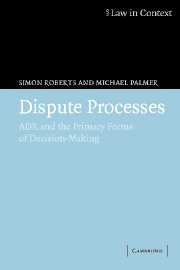Book contents
- Frontmatter
- Contents
- Preface
- Acknowledgements
- 1 Introduction
- 2 Cultures of Decision-making: Precursors to the Emergence of ADR
- 3 The Debates Around Civil Justice and the Movement Towards Procedural Innovation
- 4 Disputes and Dispute Processes
- 5 Negotiations
- 6 Mediation
- 7 Umpiring
- 8 Hybrid Forms and Processual Experimentation
- 9 The Trajectory of Alternative Dispute Resolution
- Bibliography
- Index
7 - Umpiring
Published online by Cambridge University Press: 05 June 2012
- Frontmatter
- Contents
- Preface
- Acknowledgements
- 1 Introduction
- 2 Cultures of Decision-making: Precursors to the Emergence of ADR
- 3 The Debates Around Civil Justice and the Movement Towards Procedural Innovation
- 4 Disputes and Dispute Processes
- 5 Negotiations
- 6 Mediation
- 7 Umpiring
- 8 Hybrid Forms and Processual Experimentation
- 9 The Trajectory of Alternative Dispute Resolution
- Bibliography
- Index
Summary
Introduction
Once we start to imagine the range of third-party interventions in dispute processes – forms of ‘the triad’ – the line between ‘mediation’, considered in Chapter Six, and ‘umpiring’ marks the essential internal boundary in analytic terms. It is a move from facilitation, on the one hand, to determination, on the other; the power of decision is surrendered to a third party.
The simplest case we might imagine is that where two parties in dispute agree to approach a non-aligned third – the ‘neutral stranger’ – and ask her to make a determination for them. A whole range of attributes might give the decision-maker legitimacy in a particular case. The parties might trust her: because she has no stake in the issue; because of her reputation as a wise and fair decision-maker; because of her professional background and training. Simmel underlined, in Extract 6:1, the defining quality of this simple case: it lies in the consensual nature of the reference – the disputing parties agree to the determination of their issues by someone else. As he observed: ‘the voluntary appeal to an arbitrator … presupposes a greater subjective confidence in the objectivity of judgement than does any other form of decision’ ([1908] 1950: 151).
Another instance of third-party determination arises where the rank of the third party approached – a parent, employer, religious or political superior – gives that person authority to decide the matter on request of one disputing party alone, irrespective of the wishes of the other.
- Type
- Chapter
- Information
- Dispute ProcessesADR and the Primary Forms of Decision-Making, pp. 221 - 276Publisher: Cambridge University PressPrint publication year: 2005

